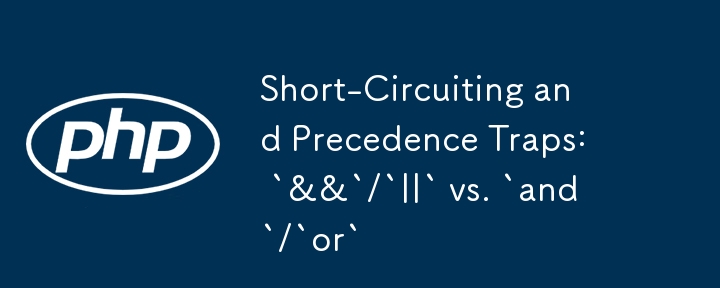 Backend Development
Backend Development
 PHP Tutorial
PHP Tutorial
 Short-Circuiting and Precedence Traps: `&&`/`||` vs. `and`/`or`
Short-Circuiting and Precedence Traps: `&&`/`||` vs. `and`/`or`
Short-Circuiting and Precedence Traps: `&&`/`||` vs. `and`/`or`
Jul 30, 2025 am 05:34 AMIn languages that support both, &&/|| have higher precedence than and/or, so using them with assignment can lead to unexpected results; 1. Use &&/|| for boolean logic in expressions to avoid precedence issues; 2. Reserve and/or for control flow due to their low precedence; 3. Always use parentheses in complex expressions to ensure clarity and correctness; 4. Know your language—Python and JavaScript avoid the trap by only offering one set of operators, while Ruby, Perl, and PHP require careful distinction.

When working with logical expressions in programming—especially in languages like Python or JavaScript—understanding the difference between the logical operators (and, or) and their symbolic counterparts (&&, ||) is crucial. But more importantly, knowing how short-circuiting and operator precedence interact can prevent subtle bugs. Let’s break this down.

Short-Circuiting Works the Same, But Precedence Differs
Both and/or and &&/|| (depending on the language) support short-circuit evaluation:
-
a && bora and b: ifais false,bis never evaluated. -
a || bora or b: ifais true,bis never evaluated.
This is useful for things like:

if user and user.is_active():
user.do_something()Here, user.is_active() only runs if user exists—thanks to short-circuiting.
But the real trap lies in operator precedence.

The Precedence Trap: and/or vs. &&/||
In Python, there’s no && or ||. You use and, or, not. But in Ruby, Perl, or some other languages, both symbolic (&&, ||) and word-based (and, or) operators exist—and they have different precedence.
Let’s take Ruby as a clear example:
# Example 1 a = true && false # => false # Example 2 a = true and false # SyntaxError! Or unexpected behavior due to precedence.
Why? Because and and or have much lower precedence than =, while && and || have higher precedence.
So this:
x = true and false
is interpreted as:
(x = true) and false
Which means x becomes true, and the whole expression evaluates to false, but x is already assigned.
Compare with:
x = true && false
Which is:
x = (true && false)
So x becomes false.
This is a massive trap when combining assignment and logic.
Practical Implications
1. Use && and || for boolean logic in expressions
If you're doing conditional assignments or complex logic, stick to the high-precedence operators:
# Safe and predictable logged_in = user_valid && token_valid || temp_access
2. Avoid and/or in complex expressions
They’re better suited for control flow or joining statements:
# Idiomatic in Ruby for flow process_data or raise "No data"
Here, or acts like a low-precedence separator—similar to ||, but safer in chains because it doesn’t bind tightly.
3. Always use parentheses when in doubt
Even if you know the precedence, others might not:
x = (user_active? && has_permission?) || admin_override
This is clearer and immune to misinterpretation.
Language-Specific Notes
- Python: Only has
and,or,not. No&&/||. So precedence is consistent (but still lower than comparisons). - Ruby/Perl: Both sets exist.
&&/||are for logic;and/orare for control flow. - JavaScript: Only
&&/||. Noand/or. So no such trap, but short-circuiting still applies. - PHP: Has both, and yes—
and/orhave different precedence than&&/||.
Example in PHP:
$x = true and false; var_dump($x); // true!
Because it’s ($x = true) and false.
But:
$x = true && false; var_dump($x); // false
Key Takeaways
- ? Short-circuiting works the same for both forms.
- ?? Precedence differs:
&&/||bind tighter thanand/or. - ? Don’t mix
and/orwith assignment unless you want the low precedence. - ? Always use parentheses in complex logic.
- ? Know your language: in Python, no issue; in Ruby/PHP, big issue.
Basically, if your language offers both, treat and/or like flow-control tools, and &&/|| like logical operators in expressions. Mixing them up can lead to bugs that are hard to spot.
The above is the detailed content of Short-Circuiting and Precedence Traps: `&&`/`||` vs. `and`/`or`. For more information, please follow other related articles on the PHP Chinese website!

Hot AI Tools

Undress AI Tool
Undress images for free

Undresser.AI Undress
AI-powered app for creating realistic nude photos

AI Clothes Remover
Online AI tool for removing clothes from photos.

Clothoff.io
AI clothes remover

Video Face Swap
Swap faces in any video effortlessly with our completely free AI face swap tool!

Hot Article

Hot Tools

Notepad++7.3.1
Easy-to-use and free code editor

SublimeText3 Chinese version
Chinese version, very easy to use

Zend Studio 13.0.1
Powerful PHP integrated development environment

Dreamweaver CS6
Visual web development tools

SublimeText3 Mac version
God-level code editing software (SublimeText3)

Hot Topics
 The Spaceship Operator (``): Simplifying Complex Sorting Logic
Jul 29, 2025 am 05:02 AM
The Spaceship Operator (``): Simplifying Complex Sorting Logic
Jul 29, 2025 am 05:02 AM
Thespaceshipoperator()inPHPreturns-1,0,or1basedonwhethertheleftoperandislessthan,equalto,orgreaterthantherightoperand,makingitidealforsortingcallbacks.2.Itsimplifiesnumericandstringcomparisons,eliminatingverboseif-elselogicinusort,uasort,anduksort.3.
 Beyond Merging: A Comprehensive Guide to PHP's Array Operators
Jul 29, 2025 am 01:45 AM
Beyond Merging: A Comprehensive Guide to PHP's Array Operators
Jul 29, 2025 am 01:45 AM
Theunionoperator( )combinesarraysbypreservingkeysandkeepingtheleftarray'svaluesonkeyconflicts,makingitidealforsettingdefaults;2.Looseequality(==)checksifarrayshavethesamekey-valuepairsregardlessoforder,whilestrictidentity(===)requiresmatchingkeys,val
 Demystifying PHP's Type Juggling: A Deep Dive into `==` vs. `===`
Jul 31, 2025 pm 12:45 PM
Demystifying PHP's Type Juggling: A Deep Dive into `==` vs. `===`
Jul 31, 2025 pm 12:45 PM
Using === instead of == is the key to avoiding the PHP type conversion trap, because === compares values and types at the same time, and == performs type conversion to lead to unexpected results. 1.==The conversion will be automatically performed when the types are different. For example, 'hello' is converted to 0, so 0=='hello' is true; 2.====The value and type are required to be the same, avoiding such problems; 3. When dealing with strpos() return value or distinguishing between false, 0, '', null, ===; 4. Although == can be used for user input comparison and other scenarios, explicit type conversion should be given priority and ===; 5. The best practice is to use === by default, avoid implicit conversion rules that rely on == to ensure that the code behavior is consistent and reliable.
 The Power and Peril of Reference Assignment (`=&`) in PHP
Jul 30, 2025 am 05:39 AM
The Power and Peril of Reference Assignment (`=&`) in PHP
Jul 30, 2025 am 05:39 AM
The =& operator of PHP creates variable references, so that multiple variables point to the same data, and modifying one will affect the other; 2. Its legal uses include returning references from a function, processing legacy code and specific variable operations; 3. However, it is easy to cause problems such as not releasing references after a loop, unexpected side effects, and debugging difficulties; 4. In modern PHP, objects are passed by reference handles by default, and arrays and strings are copied on write-time, and performance optimization no longer requires manual reference; 5. The best practice is to avoid using =& in ordinary assignments, and unset references in time after a loop, and only use parameter references when necessary and document descriptions; 6. In most cases, safer and clear object-oriented design should be preferred, and =& is only used when a very small number of clear needs.
 The Subtle Art of Pre-increment vs. Post-increment in PHP Expressions
Jul 29, 2025 am 04:44 AM
The Subtle Art of Pre-increment vs. Post-increment in PHP Expressions
Jul 29, 2025 am 04:44 AM
Pre-increment( $i)incrementsthevariablefirstandreturnsthenewvalue,whilepost-increment($i )returnsthecurrentvaluebeforeincrementing.2.Whenusedinexpressionslikearrayaccess,thistimingdifferenceaffectswhichvalueisaccessed,leadingtopotentialoff-by-oneer
 Short-Circuiting and Precedence Traps: `&&`/`||` vs. `and`/`or`
Jul 30, 2025 am 05:34 AM
Short-Circuiting and Precedence Traps: `&&`/`||` vs. `and`/`or`
Jul 30, 2025 am 05:34 AM
Inlanguagesthatsupportboth,&&/||havehigherprecedencethanand/or,sousingthemwithassignmentcanleadtounexpectedresults;1.Use&&/||forbooleanlogicinexpressionstoavoidprecedenceissues;2.Reserveand/orforcontrolflowduetotheirlowprecedence;3.Al
 A Deep Dive into the Combined Assignment Operators for Cleaner Code
Jul 30, 2025 am 03:26 AM
A Deep Dive into the Combined Assignment Operators for Cleaner Code
Jul 30, 2025 am 03:26 AM
Combinedassignmentoperatorslike =,-=,and=makecodecleanerbyreducingrepetitionandimprovingreadability.1.Theyeliminateredundantvariablereassignment,asinx =1insteadofx=x 1,reducingerrorsandverbosity.2.Theyenhanceclaritybysignalingin-placeupdates,makingop
 Mastering Polymorphism: A Practical Guide to the `instanceof` Type Operator
Jul 30, 2025 am 01:40 AM
Mastering Polymorphism: A Practical Guide to the `instanceof` Type Operator
Jul 30, 2025 am 01:40 AM
instanceofinTypeScriptisatypeguardthatnarrowsobjecttypesbasedonclassmembership,enablingsaferandmoreexpressivepolymorphiccode.1.Itchecksifanobjectisaninstanceofaclassandinformsthecompilertonarrowthetypewithinconditionalblocks,eliminatingtheneedfortype





